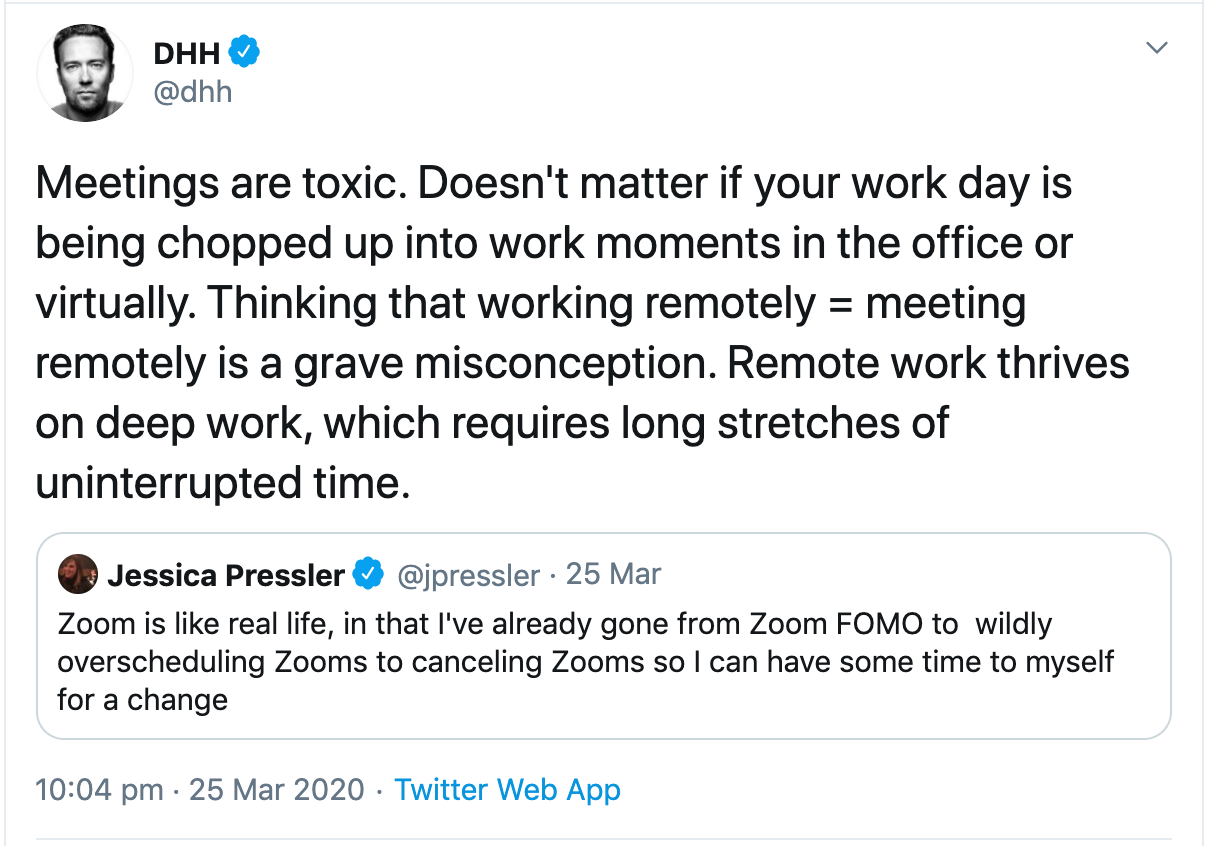People believe that employees are fundamentally less productive out of the office, mostly on account of the lack of supervision and constant distractions. And yet, research by Stanford University has shown that telecommuters are 14% more productive than their office-bound colleagues. As businesses across the globe are thrown into a work-from-home experiment, we want to know- if the data shows remote workers are more productive, why are new remote teams struggling with output?
For new remote leaders, the solution can be found by looking at those who have been successfully remote for decades: software and web developers. As an industry, coders rely on their ability to tap into what they call a “flow” or “deep work” state. This is a state of intense focus that allows them to zero in on a task and dedicate 100% attention to whatever they’re doing.
According to researchers at the University of California, Irvine, the typical office worker switches tasks every three minutes and five seconds on average. Constant interruptions mean it takes roughly 23 minutes and 15 seconds just to get back to the task in hand. That’s 23 minutes and 15 seconds wasted every time there’s a distraction, no matter how small. And this certainly adds up over time. As businesses face one of the most challenging periods of a generation, we just can’t afford to lose this kind of momentum.
So how can you minimise interruptions so that your team can access this “flow” state? Email is the primary source of distractions and interruptions, with the average worker spending 13 hours a week on emails alone. This means 28% of the workweek is taken up by email (source: Attentiv). Additionally, the introduction of real time chat apps like Slack definitely often have the opposite effect- people get drawn into the constant barrage of message streaming in. These apps can work if you need a quick answer from your team, but if everyone jumps in, the notifications and interruptions do begin to add up.
So with long email threads and real time chat apps blocking our ability to “deep work”, how do we manage teams from afar?
Lots of teams are turning to videoconferencing to solve their management needs right now- and it can work really well for checking in with your people. But be sure to watch how much time you and your team are video-chatting- otherwise you just transport all of your pointless office meetings to the virtual realm. There’s also no way of establishing concrete actions, or follow-ing up on what is spoken about. As soon as everyone hangs up, what happens next?
A study by Atlassian showed that, on average, employees spend an hour a day in meetings, for a total of 31 hours/month. That same study also discovered meetings to be the number one “time-waster” at the office.
Still unconvinced that meetings are a timewaster? David Heinemeier Hansson, the creator of Basecamp and the Ruby on Rails web development framework is a true exemplar of efficient processes- and he believes meetings and video conferences don’t actually count as “work” at all.

Developers have been reaping the benefits of efficient project management for years- and the rest of the world is just catching up.
In the agile world, management is as time efficient as everything else, and is accomplished best through “daily stand up meetings”. Stand ups are short team briefings that happen at the start of each day, designed specifically to navigate obstacles and promote progress. You ask three simple questions to every member of the team:
- What did you do yesterday?
- What are you going to do today?
- Are there any blockers to success? How can we solve them?
This way, the entire team, and the management, knows what everyone is up to in an instant- it’s a simple and effective way to eliminate roadblocks and achieve the targets. This template has even been adopted in the restaurant industry, whereby the staff have a ten minute briefing at the start of each service to go over specials, any particular groups or tables coming in, or any shortages or issues that have arisen. Again, everyone knows where they stand and are ready to face the day knowing exactly what they need to do.
Wundamail is designed to make the daily stand up as easy as possible. It automates this daily check-in, and sends it out via email, so everyone can see what’s going on at a glance. Everyone’s responses are collated into a single email, and sent out at the time of your choosing. Instant accountability and efficiency- with no interruptions.
Co-founder and CTO of Wundamail, Jon Davies, originally built Wundamail to manage his remote development teams. “It’s all about enabling your team to maximise their output- and this is a balance between making sure they have everything they need to progress, but also minimising interruptions so they can achieve their ‘flow’ and get things done”.
Ensure your remote teams are focused on what matters. Try Wundamail free today.



